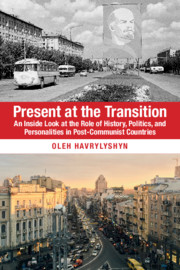 Present at the Transition
Present at the Transition Book contents
- Present at the Transition
- Present at the Transition
- Copyright page
- Dedication
- Contents
- Figures
- Tables
- Preface
- Acknowledgments
- Abbreviations
- Introduction
- Part I The Diverse Paths Taken in Transition
- Part II Choice of Strategy
- Part III Domestic Vested Interests and Reforms
- 7 The Old Guard
- 8 Formation of the Oligarchs
- 9 Corruption
- 10 Role of the Old Imperial Center
- Part IV Outcomes and Prospects
- Bibliography
- Index
7 - The Old Guard
Politicians, Technocrats, and Red Directors
from Part III - Domestic Vested Interests and Reforms
Published online by Cambridge University Press: 04 May 2020
- Present at the Transition
- Present at the Transition
- Copyright page
- Dedication
- Contents
- Figures
- Tables
- Preface
- Acknowledgments
- Abbreviations
- Introduction
- Part I The Diverse Paths Taken in Transition
- Part II Choice of Strategy
- Part III Domestic Vested Interests and Reforms
- 7 The Old Guard
- 8 Formation of the Oligarchs
- 9 Corruption
- 10 Role of the Old Imperial Center
- Part IV Outcomes and Prospects
- Bibliography
- Index
Summary
Public opinion polls of transition populations reveal inter alia a surprisingly high degree of dissatisfaction with the outcome, even in Central Europe where objective measures of income and living standards show large improvements since 1989. This is closely associated to opinions that former communists “stole” state assets and became the new capitalist elite. Like most myths, this contains elements of truth, for indeed many former communists and insiders count among the new rich – especially in the USSR region. But this is far from the case in Central Europe, as has been shown by detailed studies of who the new elite is and what happened to the old nomenklatura. There, former political elites were largely replaced by formal or informal lustration; the only part of the nomenklatura that did relatively well were the Red Directors, especially mid-level managers of the socialist period. The chapter also discusses why many Central Europeans whose incomes have more than doubled are dissatisfied: unreasonable expectations of reaching, say, Austrian incomes were not met. The catch-up was “merely” 60–70 percent thereof. Dissatisfaction is not with incomes but with fact that “others”, the most successful new entrepreneurs, did much better.
Keywords
- Type
- Chapter
- Information
- Present at the TransitionAn Inside Look at the Role of History, Politics, and Personalities in Post-Communist Countries, pp. 157 - 180Publisher: Cambridge University PressPrint publication year: 2020


